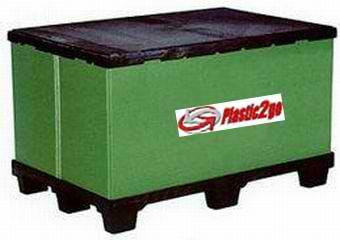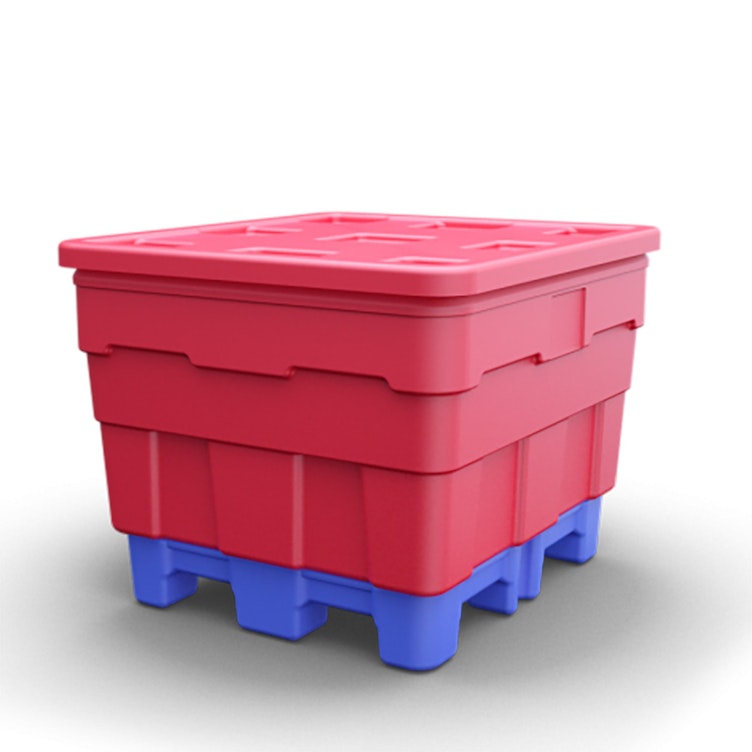Learn why Bulk Plastic Containers are ideal for modern logistics needs
Wiki Article
A Comprehensive Guide to the Various Kinds Of Mass Plastic Containers Available Today
Mass plastic containers play an essential role in numerous markets, providing remedies for storage space and transport. Their diverse kinds cater to various needs, from inflexible choices for strong materials to flexible containers accommodating different forms. Each kind offers distinct advantages, making it important to comprehend their attributes and applications. As markets progress, so do the needs for efficient container remedies. What variables should one take into consideration when selecting the right mass container?Overview of Bulk Plastic Containers

Sorts Of Mass Plastic Containers
Bulk plastic containers can be found in different kinds, each suited to specific applications. Stiff mass containers, versatile mass containers, and intermediate mass containers stand for the primary groups, each offering distinct advantages. Comprehending these kinds is important for choosing the appropriate container for transporting and storing materials.
Stiff Bulk Containers
Inflexible bulk containers are vital for efficient storage space and transportation of various materials throughout markets. These containers are typically constructed from long lasting plastics, enabling them to hold up against rough handling and environmental problems. They come in various shapes and sizes, including bins, totes, and drums, making them ideal for saving every little thing from granular compounds to fluids. Stiff containers commonly feature enhanced wall surfaces and safe and secure covers, guaranteeing the components remain safeguarded throughout transportation. Their stackable style makes best use of storage room, making them excellent for warehouses and making centers. Furthermore, numerous stiff bulk containers are recyclable and recyclable, adding to sustainability initiatives. Overall, their effectiveness and adaptability make rigid mass containers a crucial element in supply chain operations.Adaptable Mass Containers
Versatile bulk containers, usually described as versatile intermediate mass containers (FIBCs), work as a functional option for keeping a selection and carrying of dry products. These containers are generally made from woven polypropylene and are made to be lightweight yet solid, permitting effective handling and stacking. Their flexibility allows them to suit different sizes and shapes, making them appropriate for items ranging from grains to chemicals. FIBCs can be geared up with features such as spouts for simple filling and discharge, along with protective layers for improved durability. Furthermore, they are recyclable and recyclable, adding to lasting practices in markets such as farming, food processing, and building. Generally, flexible bulk containers use a effective and cost-efficient option for mass product monitoring.Intermediate Bulk Containers
Intermediate bulk containers (IBCs) are crucial for the efficient transportation and storage space of liquids and granular products across numerous sectors. These containers generally have an ability ranging from 275 to 330 gallons and are created for very easy managing and stacking. Made from resilient materials like high-density polyethylene or steel, IBCs give exceptional protection versus contamination and ecological elements. Their layout includes functions such as a built-in pallet for forklift gain access to and a detachable top for simple dental filling and cleansing. IBCs are commonly made use of in chemical, food, and pharmaceutical sectors, making sure conformity with safety policies. Their convenience and reusability make them an affordable remedy for mass storage and transport, adding to supply chain performance and sustainability.Attributes and Benefits of Bulk Plastic Containers
Bulk plastic containers are vital devices in various markets, using a combination of resilience and practicality. These containers are constructed from premium materials, making them immune to effects, chemicals, and environmental variables. This toughness guarantees item security during storage space and transportation.In addition, bulk plastic containers are light-weight, promoting simplicity of minimizing and handling delivery costs. Their stackable layout makes best use of storage space effectiveness, enabling optimized stockroom area. Many designs feature safe and secure covers or closures, providing a closed seal that preserves components and protects against contamination.
Bulk plastic containers are recyclable and frequently recyclable, adding to lasting practices. Their adaptability enables a large range of applications, from food storage space to commercial usage, enhancing their value across markets. Organizations benefit from the long life expectancy and reduced maintenance demands of these containers, making them a cost-effective service for both temporary and long-term needs.
Industries That Use Mass Plastic Containers
Numerous markets profit from using bulk plastic containers, each leveraging their one-of-a-kind buildings for specific applications. The food and beverage industry relies upon these containers for safe storage space and transport of items, while the chemical manufacturing market utilizes them for taking care of harmful products. Furthermore, the pharmaceutical circulation requires stress the relevance of durability and tidiness in packaging services.Food and Drink Market
As the demand for reliable and safe storage options proceeds to rise, the food and drink market increasingly depends on bulk plastic containers for their functional requirements. These containers offer robust, lightweight, and functional alternatives for keeping components, completed items, and waste products. Made from food-grade materials, they guarantee conformity with health and wellness requirements. Various designs, such as stackable containers and carry boxes, optimize space throughout transportation and storage, boosting logistical effectiveness. Furthermore, the openness of some bulk containers permits simple supply administration, decreasing the threat of wasting. With the industry's concentrate on sustainability, numerous manufacturers are currently offering recyclable and multiple-use options, straightening with green practices while fulfilling the high needs of food safety and health.
Chemical Manufacturing Field
The chemical production industry counts greatly on mass plastic containers for the safe and effective storage space of raw materials, intermediates, and completed items. These containers are developed to withstand different chemicals, making certain that dangerous products do not leakage or deteriorate the click here for more container itself. Typical kinds include high-density polyethylene (HDPE) and polypropylene containers, which use excellent chemical resistance and durability. Their lightweight nature and stackable layout assist in transportation and storage, enhancing room in manufacturing facilities. Furthermore, lots of mass plastic containers feature features such as tamper-evident seals and easy-to-read labeling, enhancing safety and conformity with sector regulations. Generally, mass plastic containers are essential to the chemical production process, offering trusted solutions for managing varied materials.Drug Circulation Needs
Pharmaceutical circulation counts on bulk plastic containers to meet strict security and regulative demands. These containers are essential for carrying and saving a selection of pharmaceutical items, consisting of active pharmaceutical ingredients (APIs) and finished medicines. Their style warranties security versus light, contamination, and moisture, maintaining the integrity of delicate products. In addition, bulk plastic containers are certified with sector standards such as Excellent Production Practices (GMP) and are usually made from products that are FDA-approved. Making use of these containers improves performance in the supply chain, permitting risk-free, large-scale circulation while lessening waste. Business in the pharmaceutical sector focus on making use of resilient, watertight, and tamper-evident containers to ensure product safety and security and top quality throughout the logistics process.Factors to consider for Selecting the Right Container
When selecting the appropriate mass plastic container, various variables need to be thoroughly weighed to assure suitable performance and safety. The nature of the products to be kept is paramount; compatibility with the container's product can influence honesty and safety and security. Bulk Plastic Containers. In addition, the container's shapes and size need to line up with the storage and transportation demands, guaranteeing efficient room usageLots capacity is one more vital consideration, as it must accommodate the weight of components without threat of damage or failure. The layout features, such as venting or covers, can affect functionality and access. Compliance with sector policies is important, especially in industries like drugs, where safety and security requirements are strict.
The anticipated lifespan and longevity of the container should be examined to confirm it fulfills the operational demands without frequent substitute. By examining these factors, one can select one of the most suitable mass plastic container for certain applications.
Environmental Impact and Sustainability
As services significantly focus on sustainability, the ecological effect of mass plastic containers has come under analysis. These containers, typically made from materials such as polyethylene or polypropylene, add substantially to plastic waste otherwise taken care of correctly. Their manufacturing entails the consumption of nonrenewable fuel sources, which can result in boosted greenhouse gas exhausts. Nevertheless, advancements in reusing innovation and the advancement of naturally degradable options are helping to mitigate these concerns.Many manufacturers are adopting techniques that highlight the use of recycled products, thus decreasing the demand for virgin plastics. The longevity of mass plastic containers also contributes; they are designed to be recycled several times, which can reduce their overall ecological footprint when contrasted to single-use alternatives. Eventually, the market deals with the challenge of stabilizing performance with ecological responsibility, making sustainable practices crucial for the future of bulk plastic containers.
Ideal Practices for Storage and Transport
Efficient storage space and transportation of mass plastic containers considerably influence both functional efficiency and sustainability. To make the most of room, organizations must pile containers safely, assuring security and avoiding damages. Correct labeling is important for simple recognition, which improves retrieval procedures. Additionally, maintaining a orderly and tidy storage area lowers the risk of contamination and improves safety.For transportation, picking the appropriate vehicle is crucial; containers need to be secured to avoid moving throughout transportation. Firms should additionally take into consideration using pallets to facilitate simpler loading and discharging. Normal inspections of containers for deterioration can stop pricey substitutes.
Temperature level control is one more vital aspect, as extreme conditions can endanger the integrity of the plastic. Finally, training workers on ideal practices for managing and transport warranties compliance and promotes a society of safety and security. By implementing these finest practices, organizations can boost their functional performance while adding to ecological sustainability.
Regularly Asked Concerns
Exactly how Do I Tidy Mass Plastic Containers Efficiently?
To clean bulk plastic containers properly, one must rinse them with cozy water, utilize a mild see this cleaning agent and scrub with a soft brush. Rinse thoroughly, after that permit to air dry entirely before storage or reuse.What Is the Lifespan of Mass Plastic Containers?
The life expectancy of mass plastic containers normally ranges from 5 to 10 years, relying on the material, use, and environmental conditions. Proper maintenance and storage space can greatly extend their use and resilience with time.Can Bulk Plastic Containers Be Custom-made?

Do Bulk Plastic Containers Have Guarantee Options?

Are There Regulations for Using Bulk Plastic Containers?
Yes, laws exist for making use of mass plastic containers, mostly concentrated on security, environmental impact, and product conformity. These guidelines ensure that containers meet industry criteria and are appropriate for delivering different compounds safely and efficiently.Inflexible mass containers, versatile bulk containers, and intermediate bulk containers represent the primary groups, each offering one-of-a-kind benefits. Flexible bulk containers, often referred to as flexible intermediate mass containers (FIBCs), serve as a flexible service for saving a range and carrying of dry products. The chemical production sector counts heavily on mass plastic containers for the reliable and safe storage of raw products, intermediates, and finished items. plastic bulk containers. These containers are designed to stand up to different chemicals, guaranteeing that hazardous products do not leak or weaken the container itself. Furthermore, bulk plastic containers are compliant with industry criteria such as Excellent Production Practices (GMP) and are typically made from materials that are FDA-approved
Report this wiki page